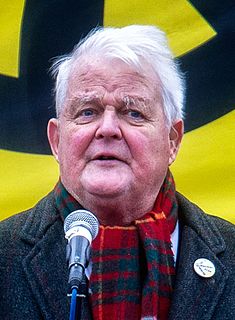A Quote by Michael Mullen
I'm very concerned about the nuclear weapons development for Iran and the destabilizing influence it has and they have in that part of the world. And I strongly endorse continued pressure, diplomatically, financially, economically.
Related Quotes
Iran's Supreme Court has issued a fatwa against the development of nuclear weapons. President [Hassan] Rouhani has indicated Iran will never develop nuclear weapons. I've made clear that we respect the right of the Iranian people to access peaceful nuclear energy in the context of Iran meeting its obligations.
I don't want to use the term "nuclear weapons" because those people in Iran who have authority say they are not building nuclear weapons. I make an appeal to the countries who do have nuclear weapons. They don't consider them a nuclear threat. But let's say a country that doesn't have nuclear weapons gets involved in building them, then they are told by those that already have nuclear weapons that they oppose [such a development]. Where is the justice in that?
What is the only provocation that could bring about the use of nuclear weapons? Nuclear weapons. What is the priority target for nuclear weapons? Nuclear weapons. What is the only established defense against nuclear weapons? Nuclear weapons. How do we prevent the use of nuclear weapons? By threatening to use nuclear weapons. And we can't get rid of nuclear weapons, because of nuclear weapons. The intransigence, it seems, is a function of the weapons themselves.
I think Donald Trump is very, very cautious about nuclear weapons, and he's seriously concerned. And this might be one of the reasons he wants to deal with Putin carefully, because he's aware of how many nuclear weapons Putin has, and that Russian doctrine is much more open about using nuclear weapons than is American doctrine.
Today we are rightly in an era of disarmament and dismantlement of nuclear weapons. But in some countries nuclear weapons development still continues. Whether and when the various Nations of the World can agree to stop this is uncertain. But individual scientists can still influence this process by withholding their skills.
When I came into office, the world was divided. Iran was resurgent. Iran is at its weakest point, economically, strategically, militarily, then since - then in many years. And we are going to continue to keep the pressure on to make sure that they do not get a nuclear weapon. That's in America's national interest and that will be the case so long as I'm president.
Negotiations with Iran, especially, will not be easy under any circumstances, but I suspect that they might be somewhat less difficult if the nuclear-weapon states could show that their requests are part of a broader effort to lead the world, including themselves, toward nuclear disarmament. Preventing further proliferation is essential, but it is not a recipe for success to preach to the rest of the world to stay away from the very weapons that nuclear states claim are indispensable to their own security.
It would seem to be the case that pressure on Iran to acquire nuclear weapons is almost totally driven by their need for a deterrent capability to avoid the fate of Iraq, Libya. The use of American military force in Syria thus sends exactly the opposite message as supposedly desired to the leadership in Tehran - and to others. North Korea has been dealt with diplomatically because it has the bomb and might use it if provoked.
Iran has been calling for it for years, and the Arab countries support it. Everyone except the United States and Israel support it. The U.S. won't allow it because it means inspecting Israel's nuclear weapons. The U.S. has continued to block it, and in fact blocked it again just a couple of days ago; it just wasn't widely reported. Iran's nuclear program, as U.S. intelligence points out, is deterrent, and the bottom line is that the U.S. and Israel don't want Iran to have a deterrent.



































